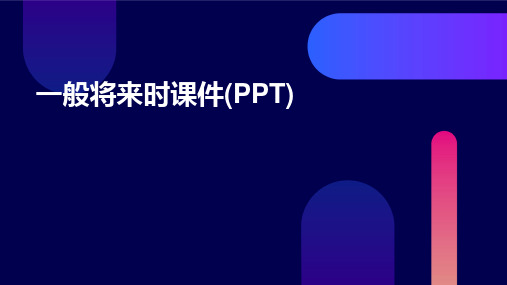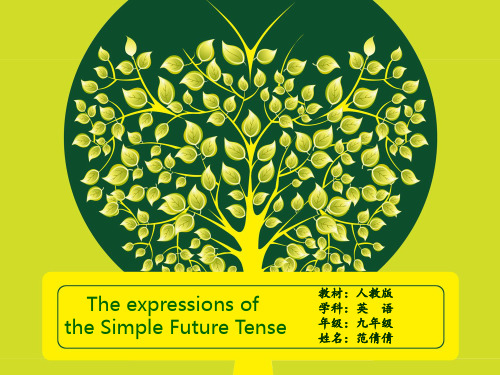小升初英语--一般将来时PPT课件
(完整版)一般将来时课件(PPT)

①
②
③
① Who will have an English party next week ?
② What will they have next week ?
③ When will they have an English party?
2. be going to 表将来
will 和be going to 的区别
回答:(肯)Yes,主语+will. (否)No,主语+won’t.
Yes,they will./No,they won’t.
They won’t(will not) have an English party next week.
注意:won’t=will not
(3).变特殊疑问句
They will have an English party next week.
他现在在北京。 He __i_s_ in Beijing now.(be)
他昨天在上海。
He w__a_s in Shanghai yesterday. (be) Hew_i_ll_be in Shanghai tomorrow. (be)
二、一般将来时的时间状语
1.与“tomorrow一家” 连用:
buy the oranges tomorrow?
2.Who _w_i_ll_i_n_ve_n_t (invent) a new
computer in 2050? 3.We _w_il_l _g_o (go) to the cinema next
Sunday. The film _w_il_l _b_e (be) very
6. He usually _g_e_t_s (get) up at 6 in the morning. Look! He i_s_g_e_t_t_in(gget) up now. But yesterday he _g_o_t_ (get) up very late, so he _w_e_n_t (go) to
(完整版)一般将来时课件(PPT)

2.与“next一家” 连用
next
time year week month term Monday at 7:00 next Sunday morning ……
2.He will find some meat in the fridge soon. (变一般疑问句) W __i_ll he _f_in_d _a_n_y_ meat in the fridge?
3.She will stay there in a week. (对划线部分提问) __H_o_w _s_o_on_ w_i_ll__ she _s_t_a_y_ there?
We will/shall go to Beingjing next week.
He will go to Beingjing next week
(2).变一般疑问句和否定句:
They will have an English party next week. Will they have an English party next week?
2. be going to+do可表示事先计划的意图,而 will 则表示说话人当时决定的意图;
We're going to drive you home after the meeting. Don't call a taxi. We'll drive you home.
I feel ill now, and I'll go to see the doctor. I'm going to see the doctor this evening.
一般将来时课件(PPT)

“be able to”表示将来有能力做某 事时,使用一般将来时形式,例如“I will be able to help you”。
情态动词如“can”、“may”、 “must”等,在一般将来时中通常直 接加动词原形,例如“I can swim”。
03
一般将来时在句子中的运用
陈述句中的使用
表示将要发生的动作或存在的状态
纠正方法
应使用正确的将来时形式,如 "He will go to the park tomorrow." 或 "He is going to the park tomorrow."
忽略动词变化规则
错误示例
They will play football in the future.(忽略了动词play在将来时中的变化)
纠正方法
在将来时中,应使用正确的助动词或情态动词形式,如 "I will be able to help you with your homework." 或 "I can help you with your homework."
错误示例
He will must finish his work before leaving.(错误地使 用了情态动词must)
作用
用于表示未来的计划、打算、预测、 假设等。
常见表达形式
will + 动词原形
表示将来的动作或状态,如“I will go to the park tomorrow.”(我明天将去公园。)
be going to + 动词原形
表示计划、打算或即将发生的动作,如“I am going to study hard this semester.”(我这 学期打算努力学习。)
一般将来时PPT课件(PPT18张)

e.g.
① Th翻er译e :is g下oi周ng这to里b将e 会a s有po一rt个s m运e动et会ing。next week.( (肯定式)
② There isn’t going to be a sports meeting next week (否定式) ③ ——Is there going to be a sports meeting next week?(一般疑问式)
be going to be + done (表示按计划或安排发生的被动动作)
be about to
(指将要发生的事情)
be.tgo. be + done (表示按计划或安排发生的被动动作)
1. The bridge will be finished
next month. (finish)
2. The problem is going to be discussed at the meeting.(be going to,discuss) 3. The sports meet is to be held on Oct. 运动会将于10月5日举行
4. do sth表将来 一般现在时表将来,主要用于时间状语从句和条件状语从句中,或者用来表示 按照时刻表的规定将要发生的事情。如: I’ll tell him about it as soon as I see him.我一见到他就告诉他这事儿。 My plane takes off at seven tomorrow morning. 我的飞机明天早上7点起飞。
A. are having B. are going to have C. will having D. is going to have
一般将来时PPT课件

•一般将来时基本概念•一般将来时结构与用法•一般将来时时间状语及标志词•一般将来时与其他时态对比•一般将来时在各类从句中运用•一般将来时误区及注意事项•总结回顾与拓展延伸目录01一般将来时基本概念定义与特点定义特点表现形式will + 动词原形be going to + 动词原形现在进行时表示将来预测未来计划与安排条件与假设030201使用场景02一般将来时结构与用法主语+ be not going to + 动词原形+ 其他成分主语+ be to not (非标准用法,尽量避免使用) + 动词原形+ 其他成分主语+ will not (won't) + 动词原形+ 其他成分Will + 主语+ 动词原形+ 其他成分?Be + 主语+ going to + 动词原形+ 其他成分?Be + 主语+ to + 动词原形+其他成分?(较少使用,多用于书面语)特殊疑问词动词原形特殊疑问词going to +成分?特殊疑问词to +(较少使用,多用于书面语)注意:在一般将来时的使用中,要注意区分不同语境和表达方式的细微差别,选择合适的结构进行表达。
同时,也要注意与其他时态的区分和联系,避免混淆使用。
特殊疑问句结构03一般将来时时间状语及标志词常见时间状语表示将来的时间状语表示计划或安排的时间状语标志词识别与运用04一般将来时与其他时态对比与现在进行时对比时间指向不同01动词形式差异02使用情境不同03时间基准差异动词形式变化使用情境区别时间范围不同动词形式区别使用情境差异05一般将来时在各类从句中运用在宾语从句中运用01 02定语从句的时态取决于它所修饰的先行词,如果先行词是将来时态,定语从句也使用将来时态。
如果先行词是过去将来时,定语从句则使用过去将来时。
定语从句中表示将来的时间状语有:tomorrow, next year, in the future 等。
06一般将来时误区及注意事项误区二过度使用“will”和“going to”。
人教版(PEP)小学英语小升初衔接--一般将来时课件

单项选择
1.Ihope that you__ a good time this evening.
A.have B.are having C.will have D.has
2.Look at those big black clouds. It __rain.Let`s hurry.
A.must B.will
♣I shall be free this afternoon. 我今天下午有空。
4 there will be+ 名词
[注意]:无论后面加单数名词或复数情势,be都必须用原形。
♣There will be only one China in the world. 世上只有一个中国。
♣There will be one chemistry classes tomorrow. 明天有一节化学课。
1 基本结构
肯定句:主语+ will +动词原形+(宾语)+其他. 否定句:主语+ will not (won’t) +动词原形+(宾语)+其他. 一般疑问句:Will +主语+动词原形+(宾语)+其他? 肯否回答:Yes, 主语+will. No, 主语+won’t.
2 基本结构
肯定句:主语+ be going to +动词原形+(宾语)+其他 否定句:主语+ be not going to +动词原形+(宾语)+其他 一般疑问句:Be +主语+ going to+动词原形+(宾语)+ 其他? 肯否回答:Yes, 主语+be. No, 主语+be not.
一般将来时课件ppt(共17张PPT)

Jim going to
afternoon?
in the playground tomorrow
4. .Jim is going to play football in the playground tomorrow afternoon.
Jim going to play football tomorrow afternoon?
2)在浊辅音和元音后读/d/.
一般过去时, 要用动词过去式. Jim is going to play football in the playground tomorrow afternoon.
Jim is going to play football in the playground tomorrow afternoon. ⑵are变为were。
there were many beautiful flowers there. 一般将来时表示将来某个时间要发生的动作或存在的状态常与表示将来的时间状语连用
⑴am ,is变为was。
So she They to read some books.
What did they do in the park? 1)在清辅音后读/t/ .
(3).动词过去式变化规则
a)一般情况下,直接加ed.如:wash--washed, look---looked; b)以不发音字母e结尾的,加d.如:like---
liked, dance---danced; c)以“辅音字母+y”结尾的,变y为i再加ed. 如:study---studied;
food and (play) lots of games. They
(come) home at 4:30.
一般将来时ppt课件

02 一般将来时的基本用法
表示将来要发生的行为
要点一
常见的助动词“will”和 “shall”可以用于表示将…
“I will go to the store tomorrow.”(我明天要去商店。 )
要点二
“be going to”也可以用于表达 将来要发生的行…
“It is going to rain later.”(待会儿要下雨了。)
肯定句
I am going to swim in the afternoon.
否定句
They are not going to watch the movie.
疑问句
Are you going to meet your friend tomorrow?
主语+be to+动词原形
肯定句
You are to hand in your homework tomorrow.
表示邀请或建议
总结词
表示邀请或建议某人做某事,通常用于 口语交流中。
VS
详细描述
在口语交流中,我们经常使用一般将来时 态来表示邀请或建议,例如:“Would you like to come to my house for dinner tomorrow?”(明天你想来我家 吃晚饭吗?)或者“Let's go for a walk after dinner.”(晚饭后我们去散步吧。 )
02
在一些情况下,我们也可以使用“be going to”来表达将来时
。例如
It is going to rain.(将要下雨了。)
03
构成
They are going to graduate next year.(他们将于明年毕业。)
- 1、下载文档前请自行甄别文档内容的完整性,平台不提供额外的编辑、内容补充、找答案等附加服务。
- 2、"仅部分预览"的文档,不可在线预览部分如存在完整性等问题,可反馈申请退款(可完整预览的文档不适用该条件!)。
- 3、如文档侵犯您的权益,请联系客服反馈,我们会尽快为您处理(人工客服工作时间:9:00-18:30)。
2. If they come, we __B_a meeting. A. have B. will have C. had D. would have
3. He C__to us as soon as he gets there. A.writes B. has written C. will write D. wrote
.
She will get up later.
He will buy this car.
.
The dog will catch the cat. I will teach maths.
.
He will eat lunch at twelve o’clock.
.
1. Mother _B_me a nice present on my next birthday. A. will gives B. will give C. gives D. give
.
He and his mother will go swimming tomorrow.
He and his mother won’t go swimming tomorrow.
Will he and his mother go swimming tomorrow?
Yes, they will.
一般疑问句:Will +主语+动词原形+(宾语)+其他?
肯否回答:Yes, 主语+will. No, 主语+won’t.
.
I will ride my skateboard next week.
I won’t ride my skateboard next week.
Will you ride your skateboard next week?
Yes, I will.
ill you do next week?
When will you ride your skateboard?
.
二.表示将来时的标志性词 tomorrow(明天),next week(下周), from now on (从现在开始),in the future(将来),the day after tomorrow (后天),next Monday (下周一) , this afternoon (今天下午),soon(不久),in two days (两天后),tomorrow morning(明天早晨),this winter(今年冬天)等。
Will Jane and her friends have a picnic in two days?
Yes, they will.
No, they won’t.
What will Jane and her friends do in two days? When will Jane and her friends have a picnic with her friends?
.
定义:be going to +动词原形,表示计划,打 算要做……事情。Be 动词根据人称的变化而变 化。
egA: I am going to play basketball.
.
Step 2 Presentation 一般将来时(be going to)
B.won’t rain
C.doesn’t rainD. doesn’t fine
6. –Will his parents go to the US tomorrow?
– No, _____B___ (不去).
A. they won’t.
B. they won’t.
C. they aren’t.
D. they don’t.
The Simple Future Tense 一般将来时
.
Step 2 Presentation 一.定义
表示将来某个时间要发生的动作或存在的状态 。 最基本的结构:will +动词原形
肯定句:主语+ will +动词原形+(宾语)+其他
否定句:主语+ will not (won’t) +动词原形+(宾语)+其他.
4. He _C_in three days.
A. comes back
B. came back
C. will come back D. is going to comes back
.
5. If it ___C_tomorrow, we’ll go roller-skating.
A.isn’t rain
7.The day after tomorrow they _A_ a volleyball match.
A. will watch
B. watches
C. is watching
D. is going to watch
.
8. Will students go to school in the future? Will students u__s_e_ pens and paper? Will students read books? Will teachers send emails to students?
.
Step 3 Practice
They will play basketball after class. They will not play basketball after class. Will they play basketball after class? Yes, they will. No, they won’t. What will they do after class? When will they play basketball?
No, they won’t.
What will he and his mother do tomorrow?
When will he and his mother go swimming?
.
Jane and her friends will have a picnic in two days.
Jane and her friends won’t have a picnic in two days.
